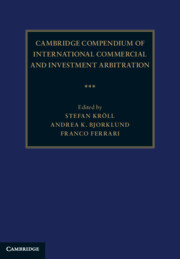Book contents
- Cambridge Compendium of International Commercial and Investment Arbitration
- Cambridge Compendium of International Commercial and Investment Arbitration
- Copyright page
- Contents
- Figures
- Tables
- Contributors
- Preface
- Part I Foundations
- Part II Public Law Questions Relating to Arbitration
- Part III Stakeholders in Arbitration
- Part IV Applicable Law
- Part V Jurisdiction of the Arbitrator
- Part VI The Arbitral Tribunal
- Part VII Procedural Questions in Arbitration
- Part VIII Role of State Courts in Arbitration
- Part IX Awards
- Part X Post-Award Issues
- Part XI Legal Concepts
- Part XII Areas of Concern
- 57 Weak Parties in International Arbitration
- 58 Arbitration and Insolvency
- 59 Global Governance’s Inescapable Legitimacy Conundrum: A Call to Reform International Commercial Arbitration
- 60 Legitimacy of Investment Arbitration
- Part XIII Arbitration and Related Fields
- Part XIV EU Law and Arbitration
57 - Weak Parties in International Arbitration
from Part XII - Areas of Concern
Published online by Cambridge University Press: 18 February 2023
- Cambridge Compendium of International Commercial and Investment Arbitration
- Cambridge Compendium of International Commercial and Investment Arbitration
- Copyright page
- Contents
- Figures
- Tables
- Contributors
- Preface
- Part I Foundations
- Part II Public Law Questions Relating to Arbitration
- Part III Stakeholders in Arbitration
- Part IV Applicable Law
- Part V Jurisdiction of the Arbitrator
- Part VI The Arbitral Tribunal
- Part VII Procedural Questions in Arbitration
- Part VIII Role of State Courts in Arbitration
- Part IX Awards
- Part X Post-Award Issues
- Part XI Legal Concepts
- Part XII Areas of Concern
- 57 Weak Parties in International Arbitration
- 58 Arbitration and Insolvency
- 59 Global Governance’s Inescapable Legitimacy Conundrum: A Call to Reform International Commercial Arbitration
- 60 Legitimacy of Investment Arbitration
- Part XIII Arbitration and Related Fields
- Part XIV EU Law and Arbitration
Summary
The principle of party autonomy in international arbitration rests upon the premise that individuals are rational maximizers of their own welfare. However, the reality sometimes differs and a number of parties suffer from weaknesses. Such weaknesses may originate from imperfect information, from insufficient expertise of the parties in testing information against their own preferences, or from the lack of bargaining power or financial means to implement their choices in practice. There is a risk that strong opportunistic actors exploit such weaknesses for their own benefit. In a worst-case scenario, this may result in undermining the weak parties’ fundamental right to access to justice
- Type
- Chapter
- Information
- Publisher: Cambridge University PressPrint publication year: 2023

